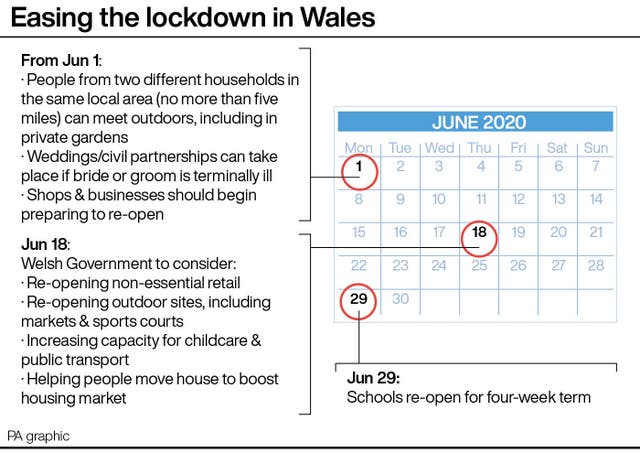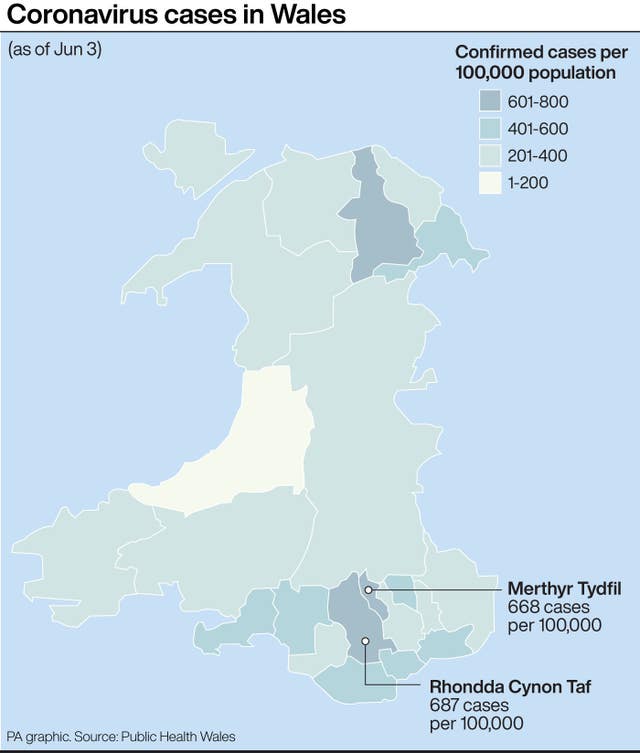
Education unions have hit back at the Welsh Government’s plan to reopen all schools on June 29.
The country’s education minister Kirsty Williams said a four-week term ending on July 27 would give pupils, staff and parents time to prepare for a “new normal” when the next academic year begins in September.
But one union accused the government of “risking lives”, while others said the date was “too much, too soon”, and describing the decision to have all pupils return instead of prioritising certain year groups as “problematic”.
It came as Public Health Wales said a further 17 people had died after testing positive for Covid-19, taking its total number of deaths in Wales to 1,371, and 82 new cases brought the total of positive tests to 14,203.
Ms Williams said a phased approach for the reopening of schools would see staggered starts, lessons, and breaks for pupils, with a third of children at most in school at any time.
Under the plans teachers will also be given priority for antibody testing.

Schools will have three-and-a-half weeks to continue preparing for the next phase of education, Ms Williams said, with the last weeks of term also to be used to prepare “mentally, emotionally and practically” for a pupils’ return in September.
She said the return plan was the “best practical option” for schools, and met the five principles she previously said would have to be met before a return could be considered.
But teachers union NASUWT called the plans “troubling” and accused the government of “risking lives”.

General secretary Patrick Roach said: “It is troubling that the Education Minister for Wales, unlike ministers elsewhere in the UK, is using emergency powers in order to press ahead with plans for the wider reopening of schools.”
He added: “Teachers and parents need to be convinced that the plans by the Welsh Government will not put at risk the health of staff, children or the general public.”
Neil Butler, NASUWT national official for Wales, also said giving all pupils the opportunity for contact time at school was “the most dangerous option in terms of virus transmission”.
He added: “There is clearly no educational purpose behind this decision. These are not good enough reasons for risking lives.”
Responding to the criticism at the Welsh Government’s daily press briefing, Ms Williams said: “It is not helpful, I think, at this stage to have inflammatory language.
“I would do nothing, and I have done nothing from this entire period when we closed schools for statutory purposes, to do anything to risk anybody’s life.
“I’m surprised that any teaching union would negate the benefits of children being in front of their members.”
Wales’ biggest education union, National Education Union (NEU) Cymru, said the plan was “too much, too soon”, saying having a third of pupils present in the larger secondary schools would lead to issues with social distancing, cleaning, and travel with hundreds of pupils on site.
Teachers union UCAC said it had “grave concerns” about the announcement, and that it was “shocked” its advice to limit the return to older pupils had been ignored.
The National Association of Head Teachers (NAHT) Cymru said despite it favouring a return before September, allowing all pupils to return instead of prioritising year groups was “problematic”.
Its director, Laura Doel, said: “School leaders have concerns about the logistics of getting every child into school on a staggered basis, especially given the very limited timescale to make this happen.”
Meanwhile Plaid Cymru accused Ms Williams of making “the wrong call”.
Its shadow education minister Sian Gwenllian said: “The Welsh Government’s testing and tracing programme has only just begun and we have limited evidence on how the virus transmits in our communities.
“Many parents and children will not be confident it is safe to return to schools. This is a rash decision.”
But the Association of School and College Leaders (ASCL) Cymru said they supported the plan, calling it a “sensible approach”.
Eithne Hughes, director of ASCL Cymru, said: “Schools desperately want to be able to have some face-to-face contact with pupils so they can check how well they are managing with remote education and provide any support they might need in terms of their wellbeing.
“The idea of bringing in small numbers of pupils at any one time to provide check-in sessions, and extending the summer term by a week to facilitate this provision, is a considered and pragmatic solution.”
Ms Williams also told Wednesday’s press conference there were no plans to fine parents if they refused to send their children to school, nor would schools be held accountable for the number of pupils who attend.


Comments: Our rules
We want our comments to be a lively and valuable part of our community - a place where readers can debate and engage with the most important local issues. The ability to comment on our stories is a privilege, not a right, however, and that privilege may be withdrawn if it is abused or misused.
Please report any comments that break our rules.
Read the rules hereLast Updated:
Report this comment Cancel